Kartell’s Bookworm, designed by Ron Arad, is a fun, flexible bookshelf that is sure to please all creative readers. The Bookworm bookshelf can be formed in any desired shape, and each support holds up to 22.05 lbs (10 kg) of books. Create a stunning décor element with the Bookworm bookshelf and your favorite novels and handbooks. The flexible shelf has a depth of 20 centimeters.
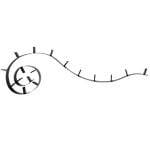
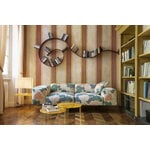
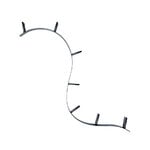
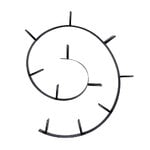
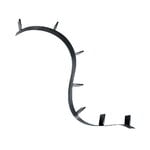
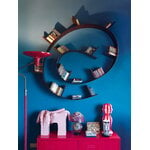
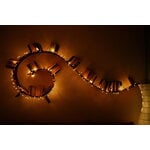
Bookworm shelf, black
Kartell
Description
Kartell’s Bookworm, designed by Ron Arad, is a fun, flexible bookshelf that is sure to please all creative readers. The Bookworm bookshelf can be formed in any desired shape, and each support holds up to 22.05 lbs (10 kg) of books. Create a stunning décor element with the Bookworm bookshelf and your favorite novels and handbooks. The flexible shelf has a depth of 20 centimeters.
Product details (6)
- Colour
- Black
- Length
- 125.98–204.72 in (320–520 cm)
- Depth
- 7.87 in (20 cm)
- Height
- 7.48 in (19 cm)
- Material
- Batch-dyed fire-retardant PVC
- Notes
-
Bookends:
125.98 in (320 cm) 7 pcs,
204.72 in (520 cm) 11 pcs
- Product ID
Designer
The Israeli designer Ron Arad moved to London in 1973 to study architecture. He made his name in the early 80's as a self-taught designer-maker of sculptural furniture. Nowadays he works both in architecture and design. Arad has become one of the most influential designers of our time. His unique curiosity for technology and materials makes his work diverse. Arad started designing for Kartell in 1997. He created, among other things, the Bookworm shelf, which became one of his most commercially successful pieces.
View all productsReviews (0)
Sustainability
The Product Sustainability Framework, our criteria of sustainable design, helps you find the most sustainable products in our selection. Read below which sustainability criteria this product has met.
Working conditions & labour 9/9
-
Equal opportunities for all employees
-
Commitment to UN Global Compact, fair compensation for all employees
-
Corporate responsibility requirements defined and communicated for suppliers
-
Systematic work for improved inclusion and well-being in the workplace
-
Transparent supply chain
-
Suppliers' compliance to a code of conduct ensured
-
Direct suppliers audited and certified
-
Compliance to the UN Guiding Principles on Business and Human Rights ensured in the supply chain
-
Support for community involvement in the supply chain
Eco-friendly production 8/9
-
Fair and resource-wise water-use in production
-
No incineration or landfilling of returned items
-
No use of endangered species as materials
-
No direct environmental emissions or waste (excl. GHGs) from production
-
The sustainability of direct suppliers' production is addressed and monitored
-
Production and material sourcing that respect biodiversity, animal rights, and natural ecosystems
-
Material-efficient and ecological packaging
-
No potentially harmful chemicals used in own production
-
Positive impact on nature’s well-being through operations that regenerate natural ecosystems
Climate impact 4/8
-
Company's direct greenhouse gas emissions identified and commitment to reduction
-
Product's carbon impact identified and commitment to reduction
-
Guidance on energy- and eco-efficient use of the product
-
Contribution to climate initiatives beyond the brand’s direct operations
-
Low-carbon or compensated transportation
-
Carbon footprint of the product calculated and goals set to reduce it
-
100 % renewable energy in own production and operations
-
Carbon neutral or carbon negative product
Sustainable materials 5/6
-
Sustainable and long-lasting material choices
-
No harmful or hazardous substances
-
Responsible raw material sourcing and production
-
Materials suited for circularity: monomaterials, recyclable finishings, renewable or recycled contents etc.
-
Ecological materials: natural, biodegradable, recyclable or recycled contents
-
Outstanding materials in terms of innovativeness, responsibility, sustainability and circularity: local production or sourcing, 100 % recycled content, C2C-certification etc.
Circular design 4/5
-
High aesthetic quality promoting long-term use of the product
-
Technically durable product design and material choices
-
Design for enduring life-long quality
-
Design and support for product maintenance, repair and upgradability
-
Innovative circular design solutions: circular service system, resale platform, remanufacturing, collection of used products, etc.









